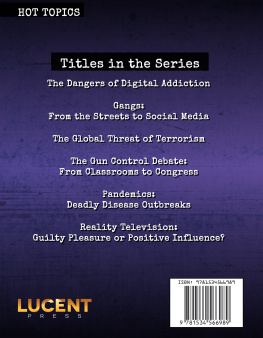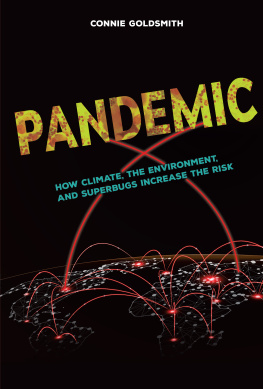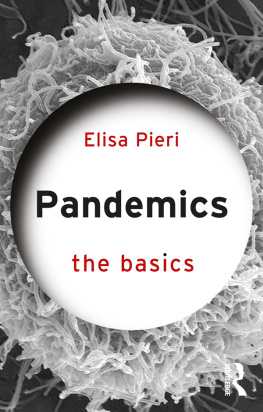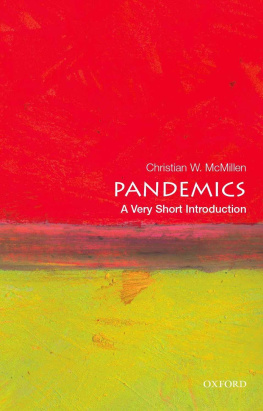Thisbook first published 2019. The present binding first published 2020.
Allrights for this book reserved. No part of this book may be reproduced, storedin a retrieval system, or transmitted, in any form or by any means, electronic,mechanical, photocopying, recording or otherwise, without the prior permissionof the copyright owner.
Foreword
Ive admired Dr.Taylors work since I began reading it as a graduate student in the mid-1990s. Hisbooks and research articles on anxiety disorders stood out as particularly brilliantand eloquent. Inevitably, our paths began to cross as we attended the same professionalconferences each year and were members of the Obsessive-Compulsive Cognitions WorkingGroup (OCCWG) that formed in the late 1990s. But it was at one particular OCCWGmeeting in 2001 in Whistler, British Columbiaand the ensuing World Congress ofCognitive Behavioral Therapy in Vancouverwhere we developed the collaborative relationshipthat has remained to this day. And what a productive relationship its been! Asof this writing, we have published four books, 25 journal articles, and 22 bookchapters together (most of them with a third colleague, Dr. Dean McKay). I havecollaborated with countless colleagues on many research and writing projects, butDr. Taylor tops them all when it comes to his astonishing mix of proficiency andefficiency.
So, whats a psychologistlike Dr. Taylor doing writing a book about pandemicsa seemingly medical conundrumfor biologists and physicians to sort out? Ill tell you what: Hes synthesizinghis interest in history, extensive grasp of research on social psychology and humanbehavior, and his substantial expertise on anxiety disorders to help us appreciatepandemics as a psychological problem as much as a medical one.
Communicable diseasesexisted during humankinds hunter-gatherer days. But it wasnt until about 10,000years ago when we began living in communities and domesticating animals, that outbreaksof sicknesses such as malaria, tuberculosis, leprosy, influenza, smallpox, and othersfirst appeared. Humans were blindsided, having little or no immunity to these viruses,and certainly no knowledge of how they could spread so easily (no one would proposethat microorganisms caused these diseases until after 1000 AD). The more interactive human civilizations becameformingcities and establishing trade routes to connect with other citiesthe morethe probability of pandemics increased.
Fast forward to modernity, where people are exceedingly mobile andmore likely to live in densely populated citiesfactors that increase the risk ofviruses spreading. Where hasty communication through a dizzying array of media alsoescalates the risk of panic and the chance that people who may be infected willtravel in an attempt to avoid illnesspotentially contributing to the spread ofthe virus. Months or years would go by before vaccines become available. In themeantime, clinics and hospitals would be overburdened, and there could be a lackof human resources to provide crucial services, due to both the demand and illness.
My point is thatour behavior increases the chances of a pandemic and our chances that if one occurred,it could be catastrophic.
And then theresthe health anxiety factorwhich Dr. Taylor knows so well from his decades of researchon the topic. Such psychological elements often receive short-shrift when consideredwithin the context of medical diseases. But the information age in which we currentlylive exposes us to so much data (and distortions) about health and illnessits not surprising were vulnerable to overestimating our risk of, and vulnerabilityto, disease. Many of us try to cope with inaccurate beliefs about health and diseasein ways that only strengthen such fears and lead them to persist and even spread.In turn, this leads to the kinds of unhealthy practices that may ironically aidthe spread of the next pandemic.
Other clinical andsocial psychological factors that Dr. Taylor shows us are relevant for understandingpandemics include prejudices, the way we name diseases, the role of the media (notsurprisingly, including social media), attitudes toward vaccinations, how we managerumors, and the psychology of conspiracies. Synthesizing all of this, Dr. Taylorgives us a picture of how human factors impact the spreading of disease and emotionaldisturbance. He convinces us that knowledge of cognition and behavior will be criticalfor managing itor, more optimistically, preventing it. Further, he proposeschanges to public health policies and for how we can best exchange information abouthealth risks.
In classic StevenTaylor style, this work is comprehensive, fusing viewpoints from multiple diversedisciplines. It is thoughtful and persuasive, grounded in scientific facts. Andit has clear societal implications for us to heed. It also provides a call (andoutline) for future research in medicine and clinical, health, and social psychology.As such, this book more than accomplishes its goalsit makes an exceptional contributionand fills a crucial gap in the literature on pandemics.
Jonathan S. Abramowitz,PhD
Professor of Psychologyand Neuroscience
University of NorthCarolina at Chapel Hill
Preface
There have been numerous pandemicsover the past century and earlier, typically arising from some form of influenza.Pandemic influenza is widely considered to be one of the leading public health threatsfacing the world today. Virologists predict that the next influenza pandemic couldarrive any time in the coming years, with potentially devastating consequences.People do not have pre-existing immunity to the pathogens causing pandemics. Effectivedrug treatments are not always available. Vaccinations, if available, and behavioralmethods are first-line interventions for reducing morbidity and mortality. Behavioralmethods include hygienic practices (e.g., hand-washing) and social distancing methods(e.g., limiting large social gatherings).
The question arises as to howbest apportion healthcare resources for managing pandemics. Such resources, by definition,are limited. It is important that resources be apportioned to essential servicesand to the development and distribution of vaccines and other methods for haltingor limiting the spread of infection. Remarkably, public health agencies have devotedfew resources for specifically dealing with the psychological factors that influencepandemic-related emotional reactions (e.g., fear, anxiety, distress) and behavioralproblems (e.g., nonadherence, avoidance, stigmatization of out-groups). Healthcareauthorities neglect the role of psychological factors in pandemic-related infectioneven though these factors are important for many reasons. They play a vital role,for example, in adherence to vaccination and social distancing, both of which arevital for stemming the spread of infection. Nonadherence to vaccination is a widespreadproblem even during pandemics.












